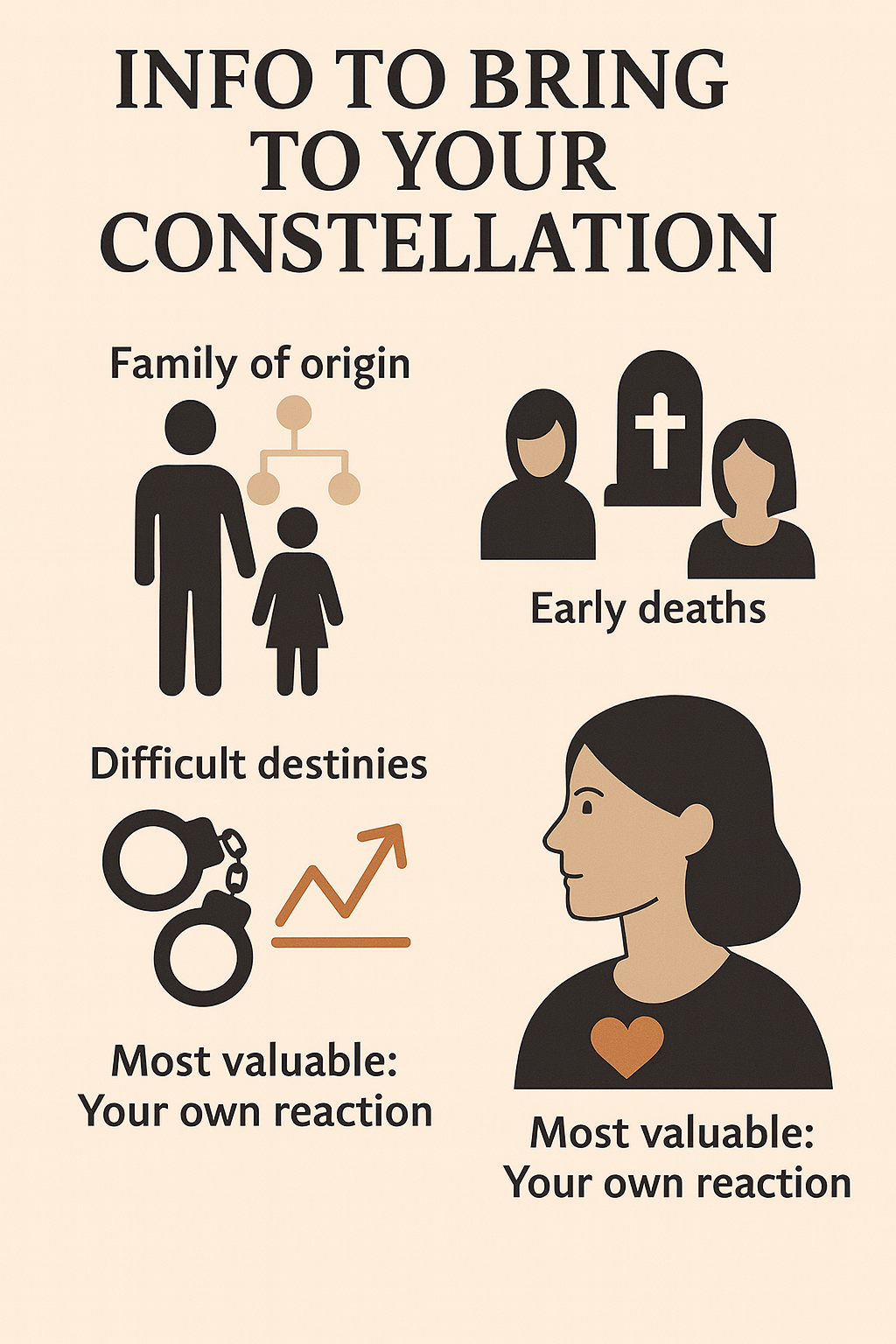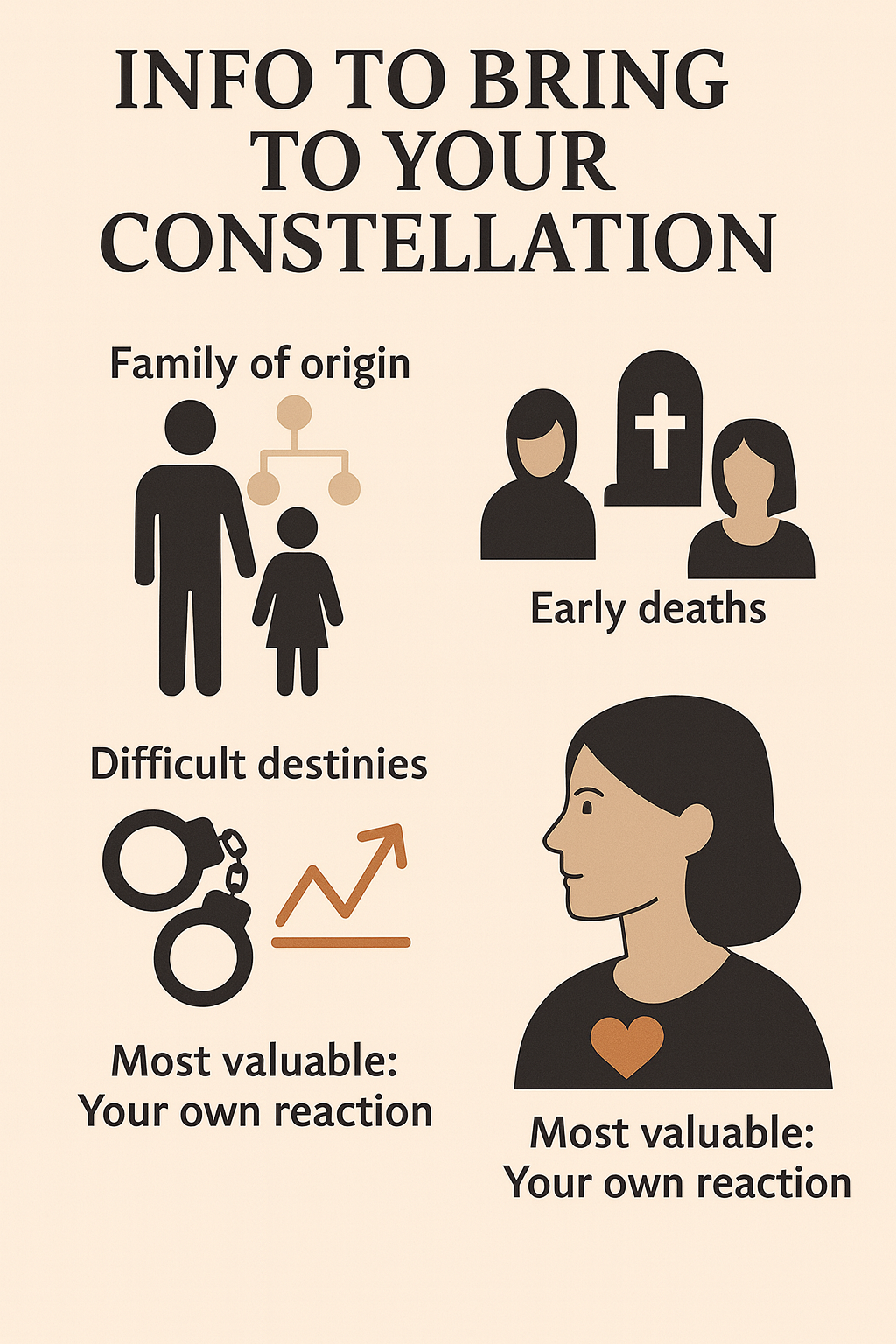What Information to Bring to a Family Constellation: A Complete Guide for First-Time Participants
What Information to Bring to a Family Constellation: A Complete and Gentle Guide
When someone prepares to attend a constellation session for the first time, one of the most common questions is: what information to bring to a Family Constellation?
It’s a natural question. People imagine they need detailed biographical data, exact dates, or full genealogical records. But the truth is far simpler and far more compassionate.
A constellation works with the movements of the soul, with the deeper layers of connection between you and your family system. Information can help, but it is not a requirement. In this guide, we explore what information to bring to a Family Constellation, why it matters (and why it sometimes doesn’t), and how you can prepare internally for the experience.
⭐ 1. Why do people ask what information to bring to a Family Constellation?
Before diving into details, it is helpful to understand why the question matters. Most therapeutic processes rely heavily on biographical data. Because of this, newcomers assume that a constellation demands the same level of preparation. But constellations are different.
Asking what information to bring to a Family Constellation often comes from:
-
A desire to “do it right”
-
Anxiety about not knowing enough
-
Fear of missing something important
-
A misunderstanding of how constellations work
Constellations rely less on data and more on inner resonance, presence, and openness. Still, bringing certain information can help orient the facilitator and illuminate important systemic patterns.
⭐ 2. The essential foundation: your family of origin
If you want clarity about what information to bring to a Family Constellation, your family of origin is the best place to start. This includes your parents, siblings, and grandparents.
Useful questions to consider:
-
How did your parents meet?
-
Did they stay together or separate?
-
Did they have previous relationships or marriages?
-
Do you have siblings or half-siblings?
-
Did your parents or grandparents experience major losses?
This basic outline is more than enough. You don’t need precise dates or documentation. When thinking about what information to bring to a Family Constellation, remember that “enough” is simply what you already know.
⭐ 3. Why early deaths matter in constellations
One of the most important elements in constellations is early death. These events shape the emotional field of the family for generations. That’s why the topic frequently appears when we ask what information to bring to a Family Constellation.
Ask yourself:
-
Were there children who died young?
-
Did anyone die during childbirth?
-
Did a parent lose a sibling early?
-
Were there sudden accidents?
You don’t need the full story—just the awareness that it happened. Early deaths can create unspoken grief, exclusions, or entanglements that show up in later generations.
⭐ 4. Difficult destinies: why they matter
Another key insight when exploring what information to bring to a Family Constellation is the presence of unusually intense or painful destinies.
These may include:
-
War experiences
-
Migration or exile
-
Prison sentences
-
Suicide
-
Bankruptcy or loss of property
-
Serious chronic illness
-
Addiction
-
Children raised outside the family
-
Adoptions or secret pregnancies
These destinies often carry emotional weight. A person may unconsciously “take on” the fate of someone who was excluded, forgotten, or judged. Knowing these stories helps the facilitator see possible systemic patterns.
⭐ 5. The role of family secrets
Every family has something that “was never spoken about.” Secrets are powerful. They create invisible tensions and emotional blockages. That is why they are relevant when asking what information to bring to a Family Constellation.
The secret itself may be:
-
Unknown
-
Half-known
-
Known but taboo
-
Known but never processed
Even sensing that “something happened” is valuable information.
⭐ 6. Your emotional reaction is part of the information
This may be the most important point of all:
Your emotional response is itself part of the constellation.
You may feel:
-
Calm
-
Tension
-
Resistance
-
Sadness
-
Fear
-
Relief
-
Curiosity
When reflecting on what information to bring to a Family Constellation, don’t overlook what happens inside you. Sometimes the emotion is more relevant than the fact.
⭐ 7. What if you don’t know anything?
Many people worry because they know very little about their family. They fear that this lack of information will make a constellation impossible. But hundreds of thousands of constellations have been done with incomplete information.
The facilitator does not need a biography—they need you.
When considering what information to bring to a Family Constellation, remember:
-
You can bring only what you have.
-
You don’t need to investigate.
-
You don’t need to ask family members difficult or painful questions.
-
You don’t need documented facts.
Your constellation will unfold from your presence, not your information.
⭐ 8. Why data is not the center of the process
When people ask what information to bring to a Family Constellation, they imagine the constellation depends heavily on intellectual details. But the real work happens through:
-
Perception
-
Emotion
-
Movement
-
Systemic intuition
-
The connection between representatives
-
The attitudes of respect and inclusion
Information helps, but it is not the heart of the process.
⭐ 9. A simple step-by-step preparation guide
If you want a practical checklist of what information to bring to a Family Constellation, here is a gentle and simple guide:
-
Write the names of your parents and grandparents.
-
Note any known early deaths.
-
Add any difficult destinies or family secrets.
-
Take a moment to notice how you feel.
-
Bring an open heart and a willingness to see what emerges.
This is more than enough.
⭐ 10. The deeper truth: trust the process
Ultimately, exploring what information to bring to a Family Constellation is less about gathering facts and more about preparing your inner space.
Constellations work because:
-
They reveal systemic movements.
-
They restore dignity and belonging.
-
They allow love to flow again.
-
They show what was hidden.
-
They point to a new order.
Your presence is the true information.
⭐ Final Reflection
If you arrive with curiosity, honesty, and openness, your constellation already has everything it needs.
And that is the deepest answer to the question:
What information to bring to a Family Constellation?

What Information to Bring to a Family Constellation: A Practical and Simple Guide
Many people feel nervous before their first session and wonder what information to bring to a Family Constellation. The truth is simple: you only need what you already know. Still, having a bit of clarity can make the experience smoother and more grounded.
⭐ 1. Start with your family of origin
When thinking about what information to bring to a Family Constellation, begin with the basics:
-
Parents
-
Siblings
-
Grandparents
-
Significant separations or new partners
No detailed history is necessary.
⭐ 2. Early deaths are especially important
Deaths that happened before their time often have strong effects on later generations. This is why they matter when asking what information to bring to a Family Constellation.
⭐ 3. Difficult destinies that may be relevant
These may include:
-
War
-
Illness
-
Prison
-
Trauma
-
Migration
-
Bankruptcy
Just knowing they occurred is enough.
⭐ 4. Bring your feelings too
Your emotional reaction is part of the information. This is often more important than facts.
⭐ 5. If you know little, it’s still enough
Constellations do not require complete family history. Many powerful sessions are done with minimal information.
⭐ 6. A simple summary checklist
When preparing what information to bring to a Family Constellation, consider:
-
Basic family structure
-
Early deaths
-
Difficult destinies
-
Secrets
-
Your emotional state
And most importantly: bring openness.
What information to bring to a Family Constellation
When you prepare for a session, it is normal to wonder what information to bring to a Family Constellation. The reassuring truth is that you don’t need to know everything about your family history. What matters most is your openness, your intention, and the willingness to look at what emerges. Still, having some basic information can help you enter the work with more clarity and confidence.
You might start with simple details about your family of origin: parents, siblings, and grandparents. Information about early deaths, difficult destinies (such as illness, migration, or financial loss), or family secrets can also be relevant—but only if you already know about them. You never need to investigate or pressure yourself.
Ultimately, the most important part of what information to bring to a Family Constellation is your inner readiness.
If you want to explore more, you can visit:
 Internal links (English pages)
Internal links (English pages)
-
Individual Constellations:
https://www.kristofmicholt.com/en/individual-constellations
 External link
External link
Creative perspectives on human connection:
https://standupclubarg.com

